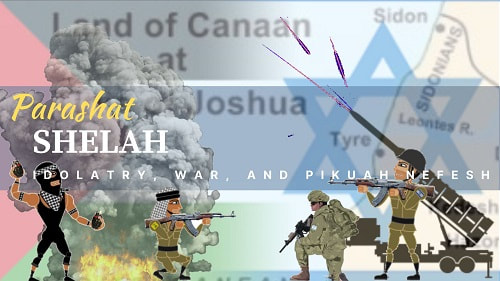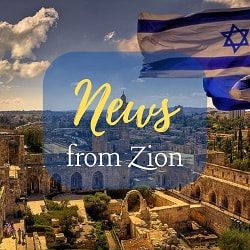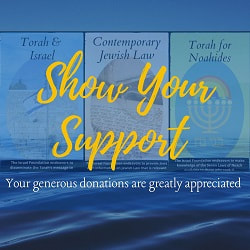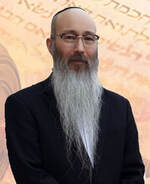|
By: HaRav Menashe Sasson Reporting from Jerusalem, Israel Published in the U.S.A. In the year 5781 (2021), Parashat Shelah was read shortly after a cease-fire agreement was signed, which suspended open hostilities between Gazan-Arabs and Medinat Yisra’el (the State of Israel), in the 5781 (2021) Gaza Battle. In Parashat Shelah, we learn about the “spies” whom Moshe sent to reconnoiter Eretz Yisra’el, in preparation of Yehoshua leading the Jewish invasion and military conquest the Yarden river and into the Land.
Bamidbar 13:17-20. Is there a connection between the Spies of Parashat Shelah and the 5781 (2021) Gaza Battle? To answer this question, a brief review of the situation relating to Gaza is in order. In response to the wishes of Gazan-Arabs, Medinat Yisra’el “disengaged” from Gaza during the year 5765 (2005), by removing all Jews from Gaza and by withdrawing all direct governmental controls over Gaza. Medinat Yisra’el, however, retained control over the air and maritime space of Gaza and has reserved the legal right to reenter Gaza with its military. Although Gaza is not a nation-state, and is not recognized by Medinat Yisra’el or the international community as a nation-state, the Gazan-Arabs have established a de facto government in Gaza, which in turn has adopted its own flag and raised its own military. Today, Gazan-Arabs strongly assert a claim to that section of real estate which is commonly known as Gaza, while Medinat Yisra’el half-heartedly asserts minimal rights over Gaza, mainly for the purpose of defending itself against Gazan-Arab missile and other attacks. This situation raises many questions, including:
I. Right of Possession & Sovereignty over Gaza A. Rights Created by Biblical Law In Parashat Lekh-Lekha, “HaShem said to Abram (prior to Abram’s name being changed to “Avraham”), ‘Go for yourself [לך-לך] from your land, from your relatives, and from your father’s house to the land that I will show you. And I will make you a great nation. . . .’” Bereshit 12:1-2. The commentator Maimonides (the Rambam) wrote:
Sefer HaMitzvot, Mitzvah 4. Thus, we see that HaShem gave Eretz Yisra’el to the Jewish people as an “inheritance” and that the Jewish people “for all time” and “even during the exile” are commanded to reside in the Land. B. Rights Existing under International Law The Arabs in general, and the Gazan-Arabs in particular, do not readily accept this Halakha (Jewish law). However, as with many things, there is more than one route to the correct answer. International law also holds, albeit for vastly different reasons, that the Jewish claim to Gaza (as well as the rest of Medinat Yisra’el) is superior to that of the Arabs. Prior to the 5678 (1918), the year when World War I ended, the geographic area which today is known as Medinat Yisra’el, including Gaza, Judea, and Samaria, was ruled by the Ottoman (Turkish) Empire. From the year 5678 (1918) through the year 5708 (1948), the geographic area in question was a British “Protectorate.” Medinat Yisra’el came into existence in the year 5708 (1948). Following the Israeli war of independence, which was started by a coordinated invasion of Medinat Yisra’el immediately after her founding, Egypt occupied Gaza and Gazan-Arabs declared Gaza to be an Arab state. However, no one, except for Egypt, Syria, Lebanon, Iraq, Saudi Arabia, and Yemen, recognized the so-called new Arab state. During the 5727 (1967) Six-Day War, Medinat Yisra’el captured Gaza, the Old City (Temple Mount), Judea, Samaria, the Golan Heights, and the Sinai Peninsula. As a result of the Oslo Accords, Medinat Yisra’el, in the year 5765 (2005), “disengaged” from Gaza, but did not relinquish the right to exercise sovereignty over Gaza. On 28 Iyyar 5781 (May 10, 2021), Gazan-Arab military forces, often concealed among Gazan-Arabs who were, ostensibly “civilians,” began launching rockets at civilian targets in Medinat Yisra’el. When the cease-fire agreement went into effect eleven days later, Gazan-Arabs had fired some 4,360 rockets and mortar shells at the southern and central areas of Medinat Yisra’el, an average of about 400 per day. Thus, we see that, because Medinat Yisra’el never relinquished its right to exercise sovereignty over Gaza and because Gazan-Arabs have committed acts of war against Medinat Yisra’el, the right of Medinat Yisra’el under international law to exercise sovereignty over Gaza is superior to any right claimed by Gazan-Arabs. II. Two-State “Solution” Some in the international community have, for decades, advanced the idea that Jews, on the one hand, and Israeli-Arabs and Gazan-Arabs, on the other, can live in peace, side-by-side, if each had its own independent, sovereign state. It is a fact that Israeli-Arabs in general, and the Gazan-Arabs in particular, have never had their own sovereign state. However, Gazan-Arabs have had a de facto sovereign state in Gaza since the year 5765 (2005), complete with their own flag and military. Furthermore, Ziad Al-Nahala, leader of the Islamic Jihad terrorist organization, is reported to have said in a “victory” speech following the Gaza Battle of 5781 (2021), that his organization is committed to continuing the fight against what he calls the “Zionist entity” until it [Medinat Yisra’el] is eliminated, regardless of the number of victims. Thus, we see that the Gaza Battle of 5781 (2021), along with many other Gazan-Arab aggressions over the years, has conclusively demonstrated that a Two-State “Solution” is simply will not work. Accordingly, the idea of a Two-State “Solution” should be abandoned. III. The Exercise of Jewish Sovereignty over Gaza Not only has a Two-State “Solution” been rejected by both Gazan-Arabs and Israeli-Arabs, Fatah Central Committee member Tawfiq Tirawi has been quoted as saying,
Posting to Facebook page of Tawfiq Tirawi (February 2020). In other words, not only do Israeli-Arabs and Gazan-Arabs not want to live in peace with Jews, they want to eliminate Medinat Yisra’el and either expel or kill all of the Jews who are physically present in Eretz Yisra’el. HaShem warned us that this would happen. At Har Sinai, when the Torah was given to the Jewish people, HaShem said,
Shemot 34:11-17. In Parashat Mas’e, we learn that HaShem spoke to Moshe in the plains of Moab, by the Yarden, , near Yereho, saying, ‘Speak to the Children of Yisra’el and say to them: When you cross the Yarden [river] into Eretz Kena’an [Eretz Yisra’el], you shall drive out all of the inhabitants of the Land before you. . . .” Bamidbar 33:50-52. Likewise, in Parashat Shofetim, we are told that “But from the cities of these peoples that HaShem, you G-d gives you as an inheritance, you shall not allow any person to live. Rather, you shall utterly destroy them. . . .” Debarim 20:16-17. The Or HaChaim wrote that:
Or HaChaim, commentary to Bamidbar 33:52. Likewise, Abarbanel said:
Abarbanel, Commentary on Shemot 34:11-12. Just as the Torah promised, the Arabs are today a “snare among” the Jewish people because we have “seal[ed] a covenant with” them simply by allowing them to remain in Eretz Yisra’el. We learn from Maimonides that Jewish law recognizes two types of wars: a milchemet misva [מלחמת מצווה], a war which is commanded by the Torah and for which no authorization from the Sanhedrin is required to wage, and a milchemet harashut [מלחמת רשות], a discretionary war, which may not be waged without first being authorized by the Sanhedrin. The conquest of Eretz Yisra’el is a milchemet misva [מלחמת מצווה]. Mishneh Torah, Hilchot Melachim 6:1. Thus, as we see there is no Biblical, legal, or practical impediment to Medinat Yisra’el reasserting and exercising full sovereignty over Gaza. IV. Lessons on Gaza from Parashat Shelah The Torah is not merely a collection of nice stories. The word “Torah” [תורה], literally translated, means “to instruct.” As we learn from the Midrash, “The deeds of the forefathers are signs for the children.” Tanchuma, Lekh-Lekha 9. What the Midrash is teaching is that the purpose of the Torah is to teach us what we should do and what we should not do. The Hebrew word “shelah” [שלח] means to “send,” or to “send forth” as in “HaShem spoke to Moshe, saying ‘Send forth for yourself men [אנשים], and let them spy out Eretz Kena’an [Eretz Yisra’el], which I give to the Children of Yisra’el. . . .’” Bamidbar 13:1-2. The commentator Rashi noted that the pasuk says “send forth for yourself” [שלח לך], which means that HaShem did not command the sending forth of spies, but rather, that He allowed the Jewish people, in their discretion, to do so. Moshe understood that, although HaShem had promised the Jewish people victory over the occupants of Eretz Kena’an, one must not rely on miracles. In other words, we must put forth our best-efforts, we must do our own hishtadlut [השתדלות]. Just days before the Jewish people were to enter Eretz Yisra’el, the Jewish “Spies,” the 12 men [אנשים], reconnoitered Eretz Yisra’el and came back with a truthful report:
Bamidbar 13:27-29. As mentioned above, the Torah refers to the twelve spies as the twelve “anashim” [אנשים], which in Hebrew means the twelve “people.” Rashi, however, taught that when the Torah refers to men as “anashim” [אנשים], it is referring not to regular men, but to men of distinction, men of importance. Thus, we learn that the twelve spies were not just ordinary men, they were great, learned men, leaders of their respective tribes, rabbis who had learned at the foot of Moshe Rabbeinu. Could it be that the spies – the anashim [אנשים] – would rebel against HaShem, Heaven forbid, by attempting to dissuade the Jewish people from entering the Land? Hardly. What the anashim [אנשים] did perceive, however, was danger. They saw that a military battle against the inhabitants of Eretz Yisra’el might result in Jewish casualties; that many Jews might lose their lives fighting for Eretz Yisra’el. But what were the spies – the anashim [אנשים] – to do? In the name of pikuah nefesh [פקוח נפש], saving lives, the anashim [אנשים], the great, learned men – the rabbis – made a Halakhic ruling: The protection of life from the dangers of war, they said, takes precedence over conquering Eretz Yisra’el. The concept of pikuah nefesh is derived from the pasuk, “You shall observe My decrees and My law, which man shall carry out and by which he shall live – I am HaShem.” Vayyirqa 15:5. The Sages have interpreted the clause “by which he shall live” to mean that almost all Torah commandments may be violated in order to protect or save human life. The Talmud lists three exceptions to this rule. A person may not engage in acts of idolatry, sexual immorality, or murder, regardless of the circumstances. T.B. Masekhet Sanhedrin 74a-b. Thus, in the name of pikuah nefesh, the people then sought to replace Moshe, appoint a new leader, and return to the land of their enslavement. “Let us appoint a chief and let us return to Misrayim.” Bamidbar 14:4. Was the people’s intention to assimilate into Misrayim society? Likely not. They probably thought they could build great Jewish communities in Misrayim, complete with Beitai Knesset [בתי כנסת] (synagogues), mikva’ot [מקואות] (ritual baths), and kosher food. The people wept that night. HaShem responded that because the people had wept, He would establish that night as a time of weeping throughout the generations. That night, according to Rashi, was the night of Tisha B’Av [תשעה באב], the 9th of the Hebrew month of Av, the day on which both Temples were destroyed and on which many other tragedies occurred in Jewish history. Rashi to Tehillim 106:27. Responding to the people’s plan to replace Moshe as their leader and return to Misrayim, HaShem said to Moshe, “How long will this people provoke Me, and how long will they not have faith in Me, despite all the signs that I have performed in their midst?” Bamidbar 14:11. As punishment for this great sin, the Jewish people were sent to wander in the desert for forty years. Thus, we see that the first lesson to be learned from Parashat Shelah is that the Rabbis are not infallible; they, just like everyone else, make mistakes. The anashim [אנשים] that are referred to in Parashat Shelah were, of course, closer to Har Sinai [הר סיני] and, having learned Torah from Moshe Rabbeinu, himself, were, without a doubt, more learned than our contemporary rabbanim [רבנים]. Next, we learn that, not only is it a misva for all time to conquer Eretz Yisra’el, going to war in order to conquer Eretz Yisra’el (when necessary to do so) is a milchemet misva [מלחמת מצווה], a mandatory war which is commanded by the Torah itself. We also learn that pikuah nefesh [פקוח נפש], the saving of human life, as important as that is, does not take precedence over the command to conquer Eretz Yisra’el. It could not, of course, be otherwise. One exception to the rule of pikuah nefesh [פקוח נפש] is that one may not engage in public acts of idolatry in order to save his life. Indeed, the Torah itself tells us that one of the purposes of conquering Eretz Yisra’el is to eliminate idolatry in the Land. “Be vigilant lest you seal a covenant with the inhabitant[s] of the land to which you are to come, lest it be a snare among you. Rather, you shall break apart their alters, smash their pillars, and cut down its sacred trees.” Shemot 34:11-13. Therefore, given that there is a Torah obligation to eliminate idolatry in the Land, one may not rely on the rule of pikuah nefesh [פקוח נפש] to avoid fighting a war to conquer the Land. Furthermore, to say there is a Torah obligation to wage war to conquer and secure Eretz Yisra’el, but to also hold that pikuah nefesh [פקוח נפש], saving human life, is an exception to that Torah obligation, would be to render the obligation to conquer Eretz Yisra’el meaningless. The exception would swallow the rule, as it simply is not possible to wage war without risking human life. Lastly, and most importantly, we learn, or at least should learn, that we must have full and complete trust in HaShem and in His Torah, regardless of what our intellects or instincts – our evil inclination [יצר הרע] – might tell us. It is true that the Gazan-Arabs would resist by force the retaking of Gaza by Medinat Yisra’el. It is true that retaking Gaza would endanger Jewish lives. It is true that many in the so-called “international community” would object. It’s also true that many other unpleasant things might occur if Medinat Yisra’el retook Gaza. But it is also true that HaShem gave Eretz Yisra’el to the Jewish people as an inheritance and commanded the Jewish people to conquer the Land. Lastly, implicit in the command to conquer Eretz Yisra’el is the prohibition of voluntarily relinquishing control over all or any part of Eretz Yisra’el to any other nation or people. As Jews, we recite the following before laying down at night and after arising in the morning: “Hear, Yisra’el. The Lord is our God; the Lord is One [שמע ישראל יהוה אלהינו יהוה אחד]. Debarim 6:4. May we, the Jewish people, including our religious leaders and the political leaders of Medinat Yisra’el, hear, understand, and follow the Torah, and no longer cause HaShem to ask: “How long will this people provoke Me, and how long will they not have faith in Me, despite all the signs that I have performed in their midst?” שבת שלום Shabbat Shalom! Copyright © The Israel Foundation. All Rights Reserved.
0 Comments
Your comment will be posted after it is approved.
Leave a Reply. |
THE ISRAEL FOUNDATION





